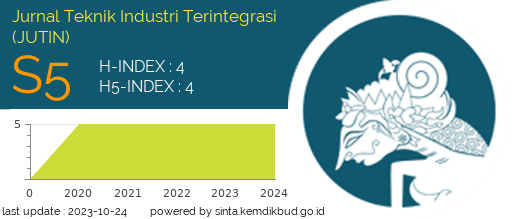Reflecting internalization and manifestation of Sundanese cultural values on leadership communication styles in the mining industry (an ethnographic study at PT Petrosea, Tbk.)
DOI:
https://doi.org/10.31004/jutin.v7i4.36208Keywords:
Mining industry, Leadership, Sundanese, Ethnography, CommunicationAbstract
This research explores the influence of Sundanese cultural values on leadership communication styles at PT Petrosea, a mining company in Indonesia. This qualitative research employs an ethnographic approach and involves three leaders at PT Petrosea who have a strong Sundanese cultural background. Data were collected through participant observation and in-depth interviews, and then analyzed qualitatively. The results show that Sundanese cultural values, such as "someah hade ka semah" (being friendly and kind to everyone), "silih asih, silih asah, silih asuh" (loving each other, educating each other, and caring for each other), and "hade tahta hade bahasa" (harmony between position and speech), are internalized and manifested in their leadership styles. These values are reflected in communication styles that are "rame" (vivacious, lively, together) and "hegar" (warm, cheerful, positive), emphasizing harmony and teamwork, as well as the ability to adapt to various situations. This research recommends integrating local cultural values into the development of contextual and sustainable leadership models.References
Agustina, R., & Mahfudz. (2020). Peran manajemen keragaman budaya dalam kinerja organisasi non profit berbasis aliansi (Studi kasus pada Jakarta Centre for Law Enforcement Cooperation). Diponegoro Journal of Economics, 9(1), 25-42.
Al Fauzan, A., Fahima, B., Geminastiti, E. A., Hadi, H. R., Firdaus, M. L., Renata, M., & Ramadhan, M. R. (2021). Budaya Jawa dan peranannya dalam nilai-nilai kepemimpinan. Jurnal Pendidikan Multikultural Indonesia, 4(1), 40–45.
Cipta, H. (2023). Pengaruh kepemimpinan terhadap kepuasan kerja karyawan pada PT. Murni Berlian Motors Pangkalan Bun. Magenta, 12(1), 17-28.
Creswell, J. W. (2012). Educational research: Planning, conducting, and evaluating quantitative and qualitative research. Boston: Pearson Education.
Ekadjati, E. S. (1995). Kebudayaan Sunda (Suatu Pendekatan Sejarah). Jakarta: Dunia Pustaka Jaya.
Fahmi, I. (2020). Ajaran kepemimpinan Jawa. Yogyakarta: Diva Press.
Hofstede, G. (2001). Culture's consequences: Comparing values, behaviors, institutions, and organizations across nations (2nd ed.). Thousand Oaks, CA: Sage Publications.
Hudaya, Z. A., & Nugroho, S. W. (2013). Kearifan lokal budaya Jawa sebagai basis model kepemimpinan yang efektif. Sustainable Competitive Advantage (SCA), 3(1), 1–8.
Ivanovich. (2008). Organizational behavior and management. New York: McGraw-Hill.
Jatirahayu, W. (2013). Kearifan lokal Jawa sebagai basis karakter kepemimpinan. Diklus, XVII(01), 264–280.
Kodariah, S., & Gunardi, G. (2015). Nilai kearifan lokal dalam peribahasa Sunda: Kajian semiotika. Patanjala, 7(1), 113-130.
Laili, W., Musayaroh, Ishaq, M., & Anshori, M. I. (2023). Kajian teori behavioral approach of leadership: Studi literatur review. Jurnal Riset dan Inovasi Manajemen, 1(3), 24-46.
Lincoln, Y. S., & Guba, E. G. (1985). Naturalistic inquiry. Beverly Hills, CA: Sage.
Miles, M. B., & Huberman, A. M. (1994). Qualitative data analysis: An expanded sourcebook. Thousand Oaks, CA: Sage.
Moedjiono, I. (2002). Kepemimpinan dan keorganisasian. Yogyakarta: UII Press.
Neuman, W. L. (2014). Social research methods: Qualitative and quantitative approaches. Boston: Pearson Education.
Northouse, P. G. (2016). Leadership: Theory and practice (7th ed.). Thousand Oaks, CA: Sage.
Padmasari, N., Makkiyah, & Isa, M. (2023). Kepemimpinan tim (Team leadership). Jurnal JIMEK, 3(2), 101-119.
Patton, M. Q. (2015). Qualitative research & evaluation methods: Integrating theory and practice. Thousand Oaks, CA: Sage.
Pratama, F. F., Nurgiansah, T. H., & Choerunnisa, R. R. (2022). Kajian nilai-nilai karakter kearifan lokal masyarakat Sunda dalam membentuk sikap moral kewarganegaraan. Jurnal Kewarganegaraan, 6(2), 3473-3483.
Rayner, S., & Cools, E. (2011). Style differences in cognition, learning, and management: Theory, research and practice. New York: Routledge.
Rivai, V., & Veithzal, I. (2004). Kepemimpinan dan prilaku organisasi. Jakarta: PT. Radja Grafindo Persada.
Siswanto, D. (2010). Pengaruh pandangan hidup masyarakat Jawa terhadap model kepemimpinan: Tinjauan filsafat sosial. Jurnal Filsafat, 20(3), 198–216.
Sofia, N. (2017). Studi literatur kepemimpinan perempuan budaya Jawa asih asah asuh untuk meningkatkan kinerja organisasi (Skripsi, Fakultas Psikologi, Universitas Islam Bandung). Bandung.
Spradley, J. P. (1980). Participant observation. New York: Holt, Rinehart and Winston.
Sugara, R. M., & Hijran, M. (2017). Model kepemimpinan politik Sunda dalam konteks pendidikan politik. In Prosiding Konferensi Nasional Kewarganegaraan III (pp. 326-337). Universitas Ahmad Dahlan, Yogyakarta.
Sulaeman, M., & Sugiarto, I. (2024). Peran motivasi, gaya kepemimpinan dalam meningkatkan kinerja pegawai di mediasi kepuasan kerja. Insight Management Journal, 4(2), 98-109.
Wandansari, G. K. R. (2018). Aktualisasi nilai-nilai tradisi budaya daerah sebagai kearifan lokal untuk memantapkan jatidiri bangsa. Yogyakarta: UNY.
Yin, R. K. (2014). Case study research: Design and methods. Thousand Oaks, CA: Sage.
Downloads
Published
How to Cite
Issue
Section
License
Copyright (c) 2024 Dwirizky Fazarullah , Jerry Heikal

This work is licensed under a Creative Commons Attribution-ShareAlike 4.0 International License.


